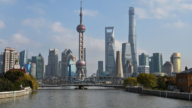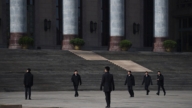【新唐人2011年11月11日讯】著名经济学家郎咸平教授近日演讲指出,中国制造业已陷入绝境。在APEC峰会召开之际,英国《金融时报》报导,北京当局研究人员建议允许汇率双向波动及人民币贬值。经济学家指出,中国面临制造业危机和欧美敦促人民币升值的双重压力。
《金融时报》11月8号报导,中国国家信息中心首席经济师范剑平说,中国外汇储备继续下降,9月份减少610亿美元,证明存在着应当引发人民币贬值的那种资本流出。
中国央行曾提出在人民币交易中引入更多的双向波动。范剑平建议“应当让人民币根据市场的要求进行调整”。
中共商务部长陈德铭在20国峰会期间说,从2005年中国汇改以来,人民币兑美元已经升值了30%。中国的贸易顺差在逐渐减少。
纽约城市大学经济学教授陈志飞接受《新唐人》采访表示,中国的制造业萎缩,导致人民币面临下行压力。
陈志飞:“很多人都觉得人民币应该贬值,这个实际是官方的一个普遍的声音。因为现在中共内部从它的经济发展来看,陷入了一个死结,因为现在发展的速度下来了,整个的制造业现在已经在萎缩。”
郎咸平教授10月22号在沈阳演讲表示,中国把制造业的定价权拱手让与欧美等国,使得制造业的利润大幅下挫,导致了06年第一次制造业危机。06年以后,地方政府的两大错误政策,一是抓建设拉动GDP,二是疯狂招商引资,造成了中国制造业的第二轮危机。
郎咸平:“到这个时候,你发现我们中国制造业的两个危机统统出现:第一个,投资营商环境全线恶化;第二个,金融海啸带来的产能过剩。于是乎你从制造业拿出大量的钱不做了,这次呢跑去炒楼、炒股、买汽车、买奢侈品、买古董艺术品去了。”
郎咸平痛斥北京当局的三大错误政策,其中包括税赋过重,五千年最高;错误的信贷政策导致企业资金链断裂,中小企业出现倒闭潮,等等。
郎咸平:“在第一场定价权大战失败之后,加上三个政策的错误,我们传统制造业的平均净利润率不到3%,09年下半年不到3%。这么低的净利润率,我们能够升值多少?那不够3%吧?那美国要求多少?20%。”
自从去年6月20号人民币重启升值,至今人民币兑美元升值已达8%。美国参议院10月2号通过了一项制裁中国操纵汇率的议案。而一些经济学家辩称,人民币升值只会让制造业转移到其他低成本生产国。
温家宝曾透露“中国的失业人口多达2亿人”。
陈志飞:“人民币升值应该是会导致中国失业率上升,它为什么希望人民币要降值,主要也是为了保住就业率,避免更大的失业率。这其实恰恰表现了中国政府在经济发展方面的不作为和它的腐败,中国的外汇统制对民营企业的发展、对自己技术革新和增加就业人口是一个非常大的打击。”
《金融时报》报导,中国国内支持人民币加快升值的意见,主要是看到过大的贸易顺差给中国经济带来的一些负面影响。他们认为贸易顺差及其带来的外汇占款导致的货币超发,是中国通货膨胀高企的重要原因。但是,《金融时报》认为这是错误的,误判了货币发行与通货膨胀之间的关系。
陈志飞:“它会加重通胀的压力,但不会造成现在中共通胀失控这种局面。所以,很多体制内的人士、包括我们自己的人士这样讲是不对的,好像通货膨胀是中国贸易发展、经济发展必然带来的,这不是的,这个其实是中共长期以来金融剥削的一个表现。”
卡内基国际和平研究院佩蒂斯教授9号警告,如果北京当局不抓紧让出地方、省级乃至中央政府的一些利益,提高家庭消费在GDP中所占的比重,中国难以在不出现社会动荡的情况下实现转型。
新唐人记者常春、李元翰、薛莉采访报导。
*****************
China’s Manufacturing Driven Into Last Ditch
In his recent speech, renowned economist Lang Xianping ,
stated, China’s manufacturing is driven into the last ditch.
APEC summit approaches and Financial Times reported
economists suggesting a system of two-way exchange rate of fluctuations and RMB devaluation.
Experts point out China is facing dual pressure about
manufacturing crisis and RMB appreciation from EU and US.
UK’s Financial Times reported on November 8 of a statement
of Fan Jianping, Chief Economist at State Information Center.
Fan said that China’s foreign exchange reserves continue
to decline at a reduction of RMB 61 billion in September alone.
Fan said that this proved the existence of a capital outflow
that would trigger a RMB devaluation.
Chinese Communist Party (CCP) Central Bank proposed to
introduce a system of two-way fluctuation in RMB trade.
Fan Jianping suggested, “RMB should be allowed to adjust
following market requirements."
At the G20 Summit, CCP Commerce Minister Chen Deming,
said that since 2005’s exchange rate reform, RMB has appreciated by 30% against the US dollar.
China’s trade surplus has gradually reduced.
Economics professor Chen Zhifei, at The City College
of New York, told NTD that the decline of China’s manufacturing caused RMB to
be under pressure.
Chen Zhifei: “A lot of people thought that RMB should be
devalued, this is actually a common view officially held.
China’s domestic economic development has been
caught in a deadlock.
With the current development slowdown,
the whole manufacturing sector has kept shrinking.”
In a speech in Shenyang on Oct 22, Prof. Lang Xianping said
China handed over the price setting power to Europe and US.
This resulted in the manufacturing industry’s profit falling
sharply, leading to the first manufacturing crisis in 2006.
Thereafter, CCP’s local authorities implemented
two erroneous polices:
1. Seeking GDP by promoting infrastructure constructions;
2. Massively inviting foreign business investments.
This caused China’s second round of manufacturing crisis.
Prof. Lang: “By this time, you could find that both two
manufacturing crises had a common phenomenon:
1. A full-scale worsening of investment environment;
2. Overcapacity caused by the global financial crisis
Vast capital was withdrawn from the manufacturing sector,
and invested in the property market for speculation, stock market, cars
and antiques."
Prof. Lang criticized CCP’s three erroneous policies of
heavy taxes, the highest in 5,000 years of China’ history;
erroneous credit policy, causing businesses’ cash flow crises,
and a tidal wave of medium to small-size business failures.
Lang Xianping: “After the first failure in the war of price
setting power came the three erroneous policies.
Thus in the second half of 2009 the average net profit margin
of our traditional manufacturing industries was less than 3%,. Such a low net profit margin.
How much did the RMB appreciate? Less than 3%, right?
Then how much did the US requests? 20 percent.”
Since June 20, 2010, when RMB restarted appreciation, the
exchange rate of RMB against USD was appreciated by 8%.
On October 2, the US Senate adopted a motion of sanctions
against CCP authorities’ currency manipulation.
However, some economists argued that RMB appreciation
would only enable manufacturing to move to other countries.
Wen Jiabao said, “China’s unemployment figure has
reached 200 million.”
Chen Zhifei: “RMB’s appreciation will cause a higher
unemployment rate in China.
Why does it want to depreciate RMB? Mainly to maintain
the employment rate, to avoid unemployment rising further.
That precisely reflects the CCP authorities’ non-constructive
actions and corruption of economic development.
China’s foreign exchange control on development of private
enterprises hit hard technology, innovation and employment.”
Financial Times reported China’s domestic views in support
of accelerating RMB’s appreciation.
Too large trade surplus has caused some negative
economic impact on China’s economy.
They believed that excessive currency issuing, caused by
trade surplus and outstanding foreign exchange funds, is important reason for China’s high inflation.
However, Financial Times thinks this is a wrong view, which
misjudges the link between currency issuing and inflation.
Chen Zhifei: “It can increase inflation pressure,
but can’t lead to the current situation of the inflation being out of CCP’ control .
So, such a point of view that is held by many people within
CCP, and even by people outside CCP, is not right.
It seems to justify that the inflation is an outcome, brought
by China’s trade development and economic development.
However, it’s not. Instead, it is a manifestation
of CCP’s long conducted financial exploitation."
Michael Pettis is a professor at Carnegie Endowment for
International Peace Research Institute.
He thinks Beijing authorities need to step up to the local,
provincial and even central government to improve the household consumption share of GDP.
Otherwise it would be difficult for China
to make a transformation without a major social unrest.
NTD reporters Chang Chun, Li Yuanhan and Xue Li
























